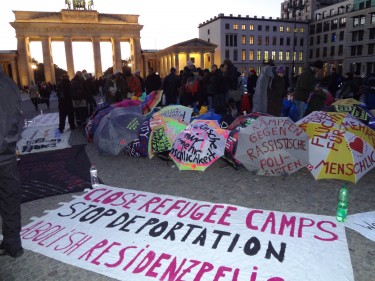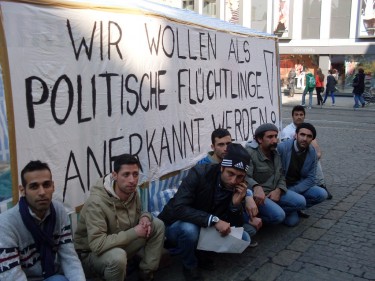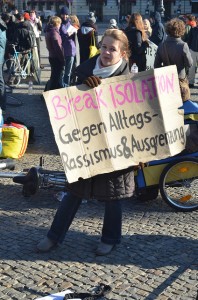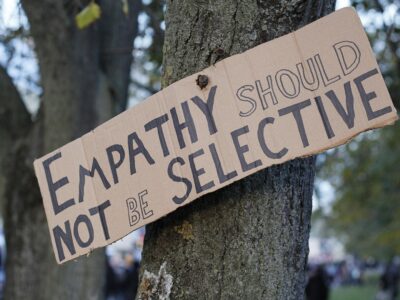On October 24, 2012 twenty-five asylum-seekers went on hunger strike in front of the Brandenburg Gate in Berlin, Germany. The protest in the highly symbolic location, which stands for the once violent division of a people by politics, is the latest in a chain reaction that began in February with the suicide of the Iranian Mohammad Rahsepar in a refugee camp in Würzburg.

Protest camp in Berlin in front of Brandenburg Gate (Photo: Metronaut.de, CC-BY-SA)
Suicides are not rare in German asylum-seeker housing. In many places refugees are housed in isolated, prison-like camps, social services are doled out in the form of vouchers, they are not permitted to work, and there aren’t enough language classes. While asylum-seekers- spatially and socially excluded, forced into unbearably tight quarters- wait for years for their application for asylum to be processed, they are not permitted to leave the district of the immigration authority responsible for them (called Residenzpflicht, or mandatory residence, in German). Despite consistent pressure from Germans and denunciations by human rights organizations, politics has thus far held fast to these inhumane living conditions in order to deter refugees, as Kay Wendel in the blog no-racism [de] describes:
Konsens unter den etablierten Parteien von SPD bis CDU/CSU war, »Dämme gegen die Fluten« zu errichten und weitere Flüchtlinge abzuschrecken, indem ihre Lebensbedingungen so unattraktiv wie möglich gemacht wurden. Ein »Bündel flankierender Maßnahmen« wurde verabschiedet: Lagerpflicht, Residenzpflicht, Arbeitsverbot, Gutscheine statt Bargeld, Essenspakete, gültig bis heute.

Refugee protest in Würzburg (Foto: Blog of Striking Iranian Refugees Würzburg, gustreik.blogsport.eu, CC BY-NC-SA)
After Mohammad Rahsepar hanged himself in February, spontaneous protests began in Würzburg [de]. Entirely ignored by politicians, several refugees went on hunger strike and erected a semi-permanent protest camp. First they had to fight a legal battle with the city of Würzburg for their right to demonstrate and to go on hunger strike. Even then, a political reaction failed to materialize.
Asylum-seekers from other cities were prohibited from joining the protests, pointing to the mandatory residence provision (Residenzpflicht). Subsequently, refugees built protest camps in eight other cities over the summer under the name “Refugee Tent Action.” Then, on September 8, about 70 refugees and supporters set out in a refugee caravan [de] on the almost 600-km stretch from Würzburg to Berlin, where they – after a confrontation with Neonazis- arrived on October 6. They are determined to stay until their demands are met: abrogation of mandatory residence, mandatory camp residency, and deportation.

Supporter of the protest camp in Berlin (Photo by Flickr user @handverbrennung Enno Lenze, CC BY 2.0)
The protest is led mostly by Iranian refugees, young people that were forced to leave their homeland after the Green Revolution. In addition to their willingness to fight for their rights, they have also brought along an appreciation or the possibilities of the internet and of social media, which they are now using for their protest against German asylum conditions. The protest camps in the individual cities and the main camp in Berlin set up blogs and Facebook groups, and their actions have had a major echo on Twitter. By doing so, they managed to organize the largest demonstration to date against the living conditions of asylum-seekers, with 6,000 protesters on October 13, despite the determined lack of attention in among mainstream politics and their media.
On October 15, refugee and activist protesters took over the Nigerian Embassy in Berlin to demonstrate against the cooperation of embassies, without which deportation from Germany would not be possible. Multiple asylum-seekers were arrested in the process and according to the police’s own statement, mistreated, which they report on in this video from YouTube user leftvision clips:
Eventually, around two dozen refugees went on hunger strike. On the last weekend in October, they were shocked with a sudden onset of winter by a temperature drop of 20 degrees. The numerous supporters have been taking care of the demonstrators with blankets, warm clothing, sleeping mats and rain tents, which are repeatedly confiscated by police. The justification: this constitutes camping equipment, and camping is not allowed in front of Brandenburg Gate.
If at the start the refugees found wide support from citizen media journalists and social media, now the web has exploded in outrage over the police measures. Canan Bayram (@friedhainerin) writes:
@friedhainerin 4 Flüchtlinge im Polizeiauto,brutale Festnahme einer Unterstützerin, in der Nacht werden die Polizisten extrem – kaltes Berlin #refugeecamp
Others, for example, Marina Weisband, called for material support of the freezing protesters:
@Afelia Berliner! Könntet ihr euch etwas Honig, Jacken und Decken unter den Arm klemmen und am Pariser Platz vorbei schauen? #refugeecamp
There’s also consideration of political and legal consequences. Anne Roth tweeted:
@annalist Versucht, die Polizeigewalt detailliert zu dokumentieren, insb. Gesichter. Die einzige Möglichkeit, sie zu identifizieren. #refugeecamp
Events were captured via Live-Streams and documented on blogs. Enno Lenze writes on his blog:
Wieso man mitten in der Nacht mit einem so martialischen Aufgebot Leuten ihre Wärmflaschen abnehmen muss, verstehe ich weiterhin nicht. Sie protestieren friedlich, provozieren nicht, beschimpfen nicht und stellen sicher keine Gefahr da. Bitte lest euch mal durch, was Leute dazu bringt, ihre Heimat zu verlassen und woanders um Asyl zu betteln.
For months the mainstream media ignored the refugee protest, with the exception of a few lines in the local press. Only the enormous echo on the internet, especially since the police have gone after the protesters with increasing severity, has forced them in the past few days to address the issue. The cynicism of the traditional media was commented on by Twitter user Fluechtlingsstreik:
@FluchtundAsyl Die deutschen Medien berichten gerne, wenn in anderen Laendern gegen Menschenrechte verstossen wird, aber wo sind sie jetzt? #refugeecamp
Perhaps this support on the internet has contributed to giving the refugees the confidence to take legal steps: after the takeover of the Nigerian Embassy, complaints of assault were made against multiple police officers [de]. According to Metronaut.de, criminal complaints have also been made against the district mayor Hanke and the city's Interior Minister Henkel for violation of the freedom of assembly and failure to act.
Update on 11.02.
After a discussion with the Federal Commissioner for Migration, Refugees and Integration, Maria Böhmer, the refugees ended their hunger strike on Friday, November 2. Böhmer seemed ready to comply on the questions of refugee camps and mandatory residence, but maintained the official government line with regards to deportation. On Monday, Berliner Platz at Brandenburg Gate must be cleared for a registered demonstration. Where and how the protest camp will be continued is still unknown.







1 comment